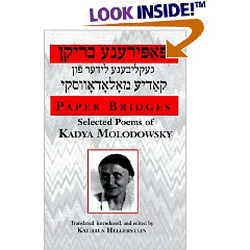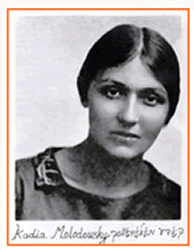Kadya Molodowsky (1894-1975)
Jewish Heritage Online Magazine
http://jhom.com/personalities/kadya_molodowsky/index.htm
published six major books of poetry in Yiddish, including the children's poems for which is she best known today, as well as fiction, plays and essays. She participated in nearly every aspect of Yiddish literary culture that existed in her lifetime, first in Poland, where she lived until 1935, when she emigrated, and then in America, where she lived until her death.
Before her emigration, Molodowsky taught young children in the Yiddish schools of Warsaw. In New York City, she supported herself by writing for the Yiddish press and founded a literary journal, Svive (Surroundings), which she edited for nearly thirty years. In 1971, she was awarded the Itzik Manger Prize, the most prestigious award in the world of Yiddish letters, for her achievement in poetry.
Kadya Molodowsky as a young woman
Molodowsky was one of the few Yiddish women poets able to sustain and develop her writings throughout her life. She published continuously from 1927 until 1974. All her books, both poetry and prose, reflect the cultural and historical changes that the author experienced. But the poetry in particular evinces the often contradictory influences of the cultures among which Molodowsky lives – the Russian symbolists, the Yiddish modernists (and through them, modern American and European poetry), the Hebrew Bible, rabbinic writings, Yiddish prayers for women, social protest poetry, modern drama, and world folk- and classical lore.
Although the distinctive voice that emerged from this confluence of cultures addressed the same social issues that concerned her contemporaries, it was given its particular force by Molodowsky's immediate and intense focus on women's lives and works. Because of this focus, Molodowsky's poems reshape the questions the pervaded modern Yiddish poetry: questions about the poet's political responsibility, national identity, religious belief, aestheticism, and individualism.
The themes of her poems are often polemical, but they bring the compressed intensity of the lyric to the expansive forms of the meditation, the narrative, and the poetic sequences. Molodowsky's poems play constantly yet unexpectedly upon the Yiddish language – its musicality, emotional complexity, and mélange of dictions. They also encompass the folk idioms, the learned rabbinic phrases, crass Americanisms and neologisms, political clichés, and literary affectations. As a result, the poems have a deliberate self-consciousness that exposes the poet to her own merciless gaze.
As Molodowsky developed, her poetry came to embody the conflicts within her life. A woman with modernist sensibilities, a Jew thrown into crisis by secularism, an intellectual enraged by social injustice but wary of ideology, Molodowsky wrote in a tradition that was not always sympathetic to her sexual identity, her religious feelings, or her poetic politics.
A House with Seven Windows
Short Stories
http://www.syracuseuniversitypress.syr.edu/spring-2006/house-seven.html

Kadya Molodowsky
Translated from the Yiddish by Leah Schoolnik
A stark yet tender collection of short stories by Kadya Molodowsky, one of Yiddish literature's most important female writers.
Chosen for the prestigious New York City publication, Mann About Town's Books to Read this Month
Description
A House with Seven Windows by Kadya Molodowsky is the famed Yiddish poet's only collection of short stories. Written in simple prose, these stories are subtle portraits—tragic-comic, bittersweet, always generous spirited—of ordinary people: Jews in pre-World War II Eastern Europe and Jews struggling to adjust to life in America. A traditional-minded husband is defeated by his wife who wants only the latest fashion. A community leader's position is supported and maintained by his more energetic and political- minded wife. A couple, ardent supporters of the newly formed state of Israel, nevertheless find themselves at odds with their son who intends to live there. An American Jew who almost single-handedly supports his shtetl in Europe returns to find that it has been obliterated by the Nazis. A couple, newly arrived from the DP camps in Europe, struggles to set sail on the wide seas of America and succeeds, but at a price.
While many of the stories are set in Europe and are, in fact, memoirs of Jewish shtetl life, others depict the classic dilemmas of immigrants wrestling with their own identity—stories about adapting to a new culture yet attempting to maintain traditional customs, stories about the inability of one generation to understand the other. Molodowsky's lucid style and keen observation of the absurd and the sublime offer readers beautifully crafted stories filled with richly drawn character portraits.
Author
Kadya Molodowsky was born in Bereza Kartuska, a town in Belarus. She was active in the Yiddish social and literary movements in Kiev and Warsaw in the 1920s. Her books of poetry include Paper Bridges: Selected Poems of Kadya Molodowsky.
Leah Schoolnik has translated other prose works by Kadya Molodowsky and short stories by Yossl Birstein, Avrom Dubleman, Pincas Berniker, and Osher Schuchinsky. They remain in translation.
